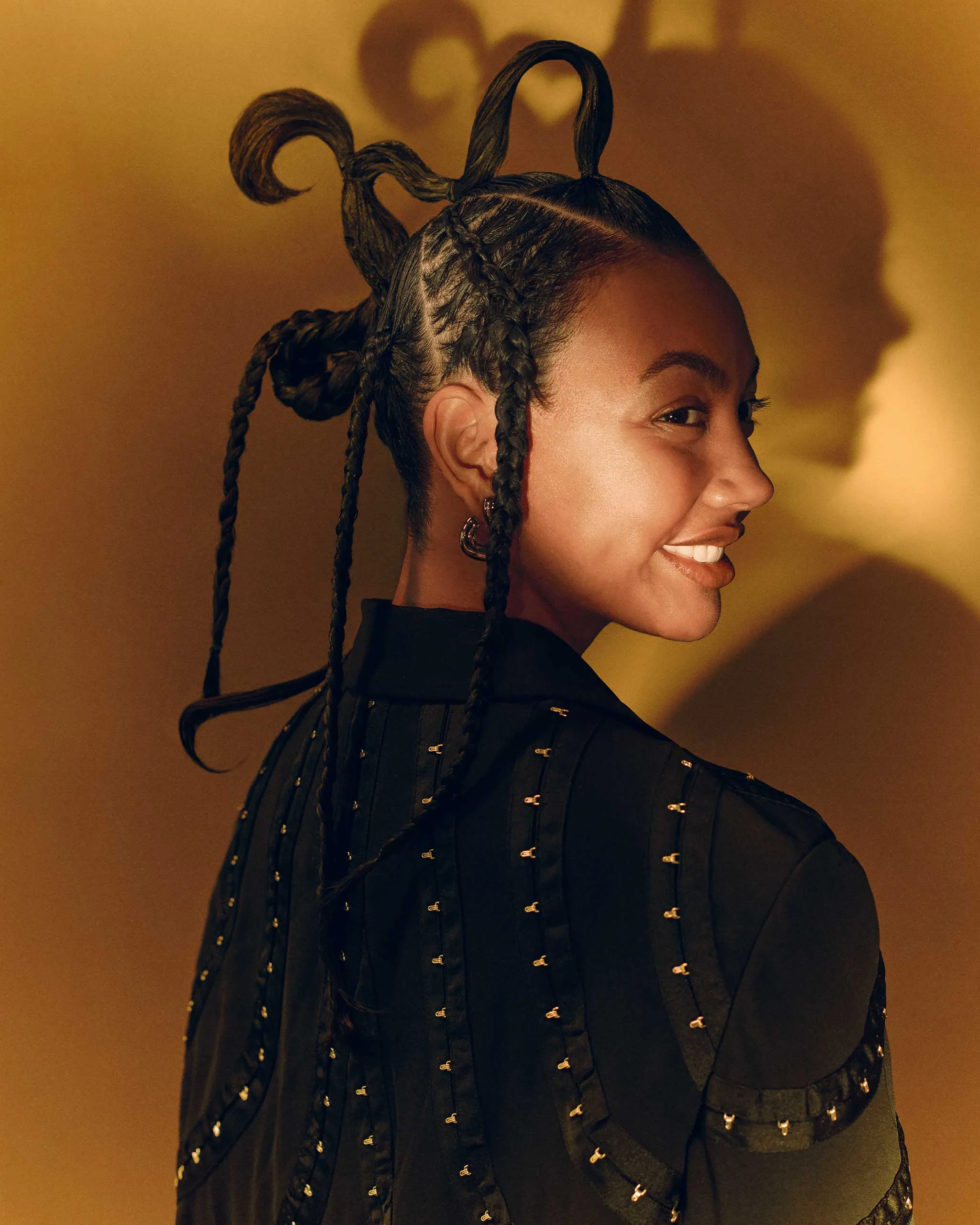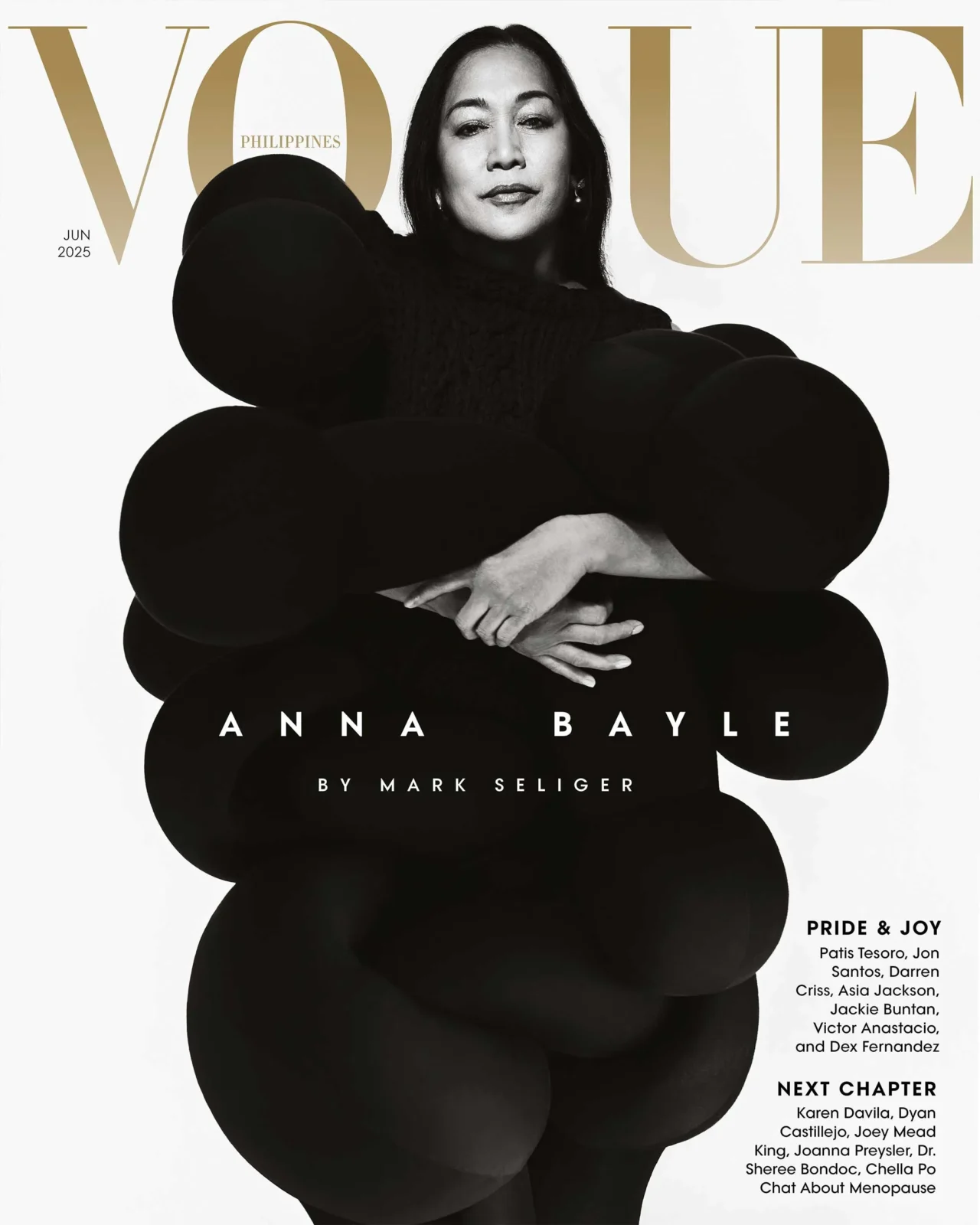ANNAKIKI four-star suit jacket, ALEXIS BITTAR earrings. Photographed by Charles Lu for the June 2025 Issue of Vogue Philippines
Content creator and activist Asia Jackson on navigating the layers of her identity and finding beauty in its complexities.
While many grew up with more commonly known folk dances like tinikling, Asia Jackson had an upbringing steeped in Igorot traditions like tayaw, passed down from her mother, observed during trips home to Benguet, and in the brief time she lived in the Philippines.
As Asia recalls, the indigenous Ibaloi-Igorot people would dance tayaw to express joy and celebration. The dance, she says, is typically performed by a man and a woman, draped in woven blankets and wrapped in traditional sarong, respectively. To the clang and beat of the Igorot gangsa (gong) and sulibao (drum), she saw them move rhythmically in circles, arms outstretched, feet bouncing against the earth. This was one of Asia’s fondest childhood memories.
Now based in California, her family continues to stay connected to their indigenous roots. In a video shared on Instagram, Asia joins them as they freestyle in sync to the rhythm of the gongs at a wedding celebration. “Tayaw is more about a feeling,” she writes. “You listen to the music, tap into how it makes you feel, and go.”
It’s the same instinct that’s carried her through life: the pull to move to her own rhythm, to follow where her heart leads. At 30 years old, sharing both African American and Indigenous Filipino roots, the content creator and activist has carved out a space entirely her own, both figuratively and literally.
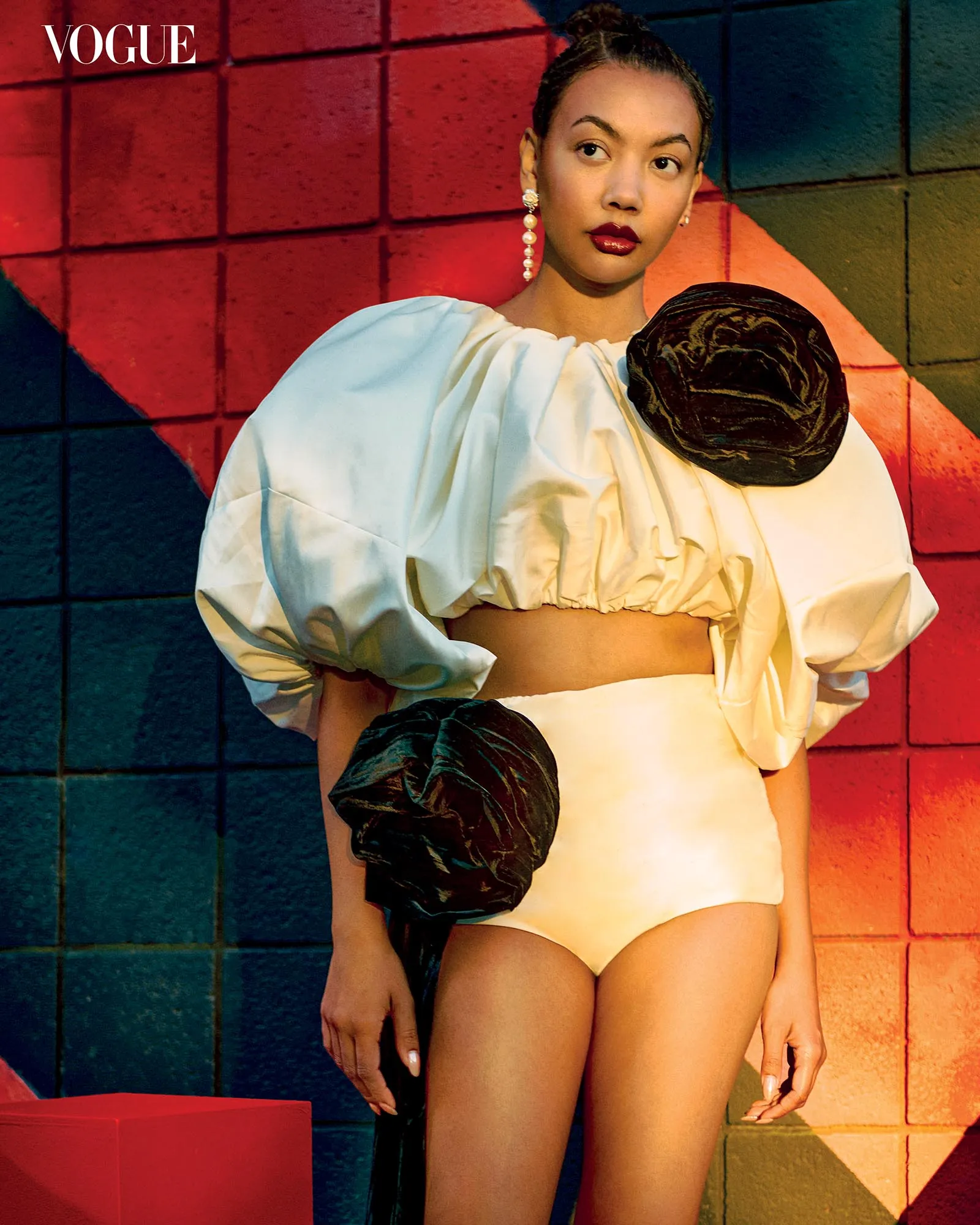
At the time of our conversation, Asia is in the middle of moving to a new apartment. The day is just beginning in Manila, but she’s winding down in Los Angeles, surrounded by heaps of boxes in what is shaping up to be her new home office. It’s only February, but she says it’s already been a busy start of the year, courtesy of travel, brand deals, and personal commitments. Still, she appears on screen with the same ease and warmth she’s known for online. “This [interview] is my last socializing thing for today,” she shares with a laugh, noting that she typically ends her evenings with a bit of editing to check off the to-do list.
Her life didn’t always move to this rhythm. As a child, Asia was shy and soft-spoken. Her mom, Melinda Jackson, says she would’ve never guessed she’d pursue a career in entertainment.
At 11, Asia took a liking to computers and taught herself how to code. Naturally, she went on to study it in university, but after a while, she started to feel lost. It wasn’t until a college film production class that something clicked, and she discovered a love for creating. Eventually, she made the choice to “take the unconventional path” and drop out. She pursued acting and landed roles on shows like Modern Family.
But Asia found that she enjoyed being on both sides of the camera. In 2016, she started posting self-made videos on YouTube, which allowed her to express herself in ways she couldn’t in person. “It was such a blessing,” she reflects. “YouTube gave me a really great opportunity to find my voice and figure out who I was without having to do it in front of a live audience, so to speak.”
“One day, seemingly out of nowhere, I had a moment of clarity. I woke up and thought to myself, ‘I’m tired of people telling me who I am.’”
Today, Asia’s platform has grown into an influential space, with almost 700,000 subscribers on YouTube and nearly 200,000 on both Instagram and TikTok. She also started a podcast in 2022 called SKNFLUENCER which explores how beauty and fashion intersect with race and identity, a relationship that she’s always taken interest in. “I didn’t want to just do haul videos,” she explains. “I really want to be intentional and share how your culture or your identity or your experience can manifest into a personal style.” As a creative, she says her ultimate goal is to help others find their personal style by teaching them to embrace their own unique identity.
Born to an African American father and an Indigenous Filipino mother, questions of identity shaped much of her early life. One of her earliest memories goes back to second grade in Great Falls, Montana, when a white classmate called her “African-American.” As a child, it left her confused. “My dad looked a certain way, my mom looked a certain way, and I looked like a mix of both of them, so why was I being reduced to just one part of my identity?”
Her father’s military career also meant constant relocation, making it harder to find a sense of belonging. “I rarely had time to settle in or feel rooted in any one community. As a mixed Black and Filipino kid, I often felt like an outsider no matter where we lived,” she shares. “I was ‘too Asian’ to be fully accepted as Black, ‘too Black’ to feel fully embraced as Asian, and ‘too indigenous’ to be fully embraced as Filipino. It was a con- stant balancing act, trying to navigate iden- tities that felt both deeply personal and, at times, defined by how others perceived me.”
“My struggles with identity persisted well into my early 20s,” Asia continues. “But one day, seemingly out of nowhere, I had a moment of clarity. I woke up and thought to myself, ‘I’m tired of people tell- ing me who I am.’ I realized I had spent my entire life trying to fit into the identities others imposed on me, without ever taking the time to define myself on my own terms.”
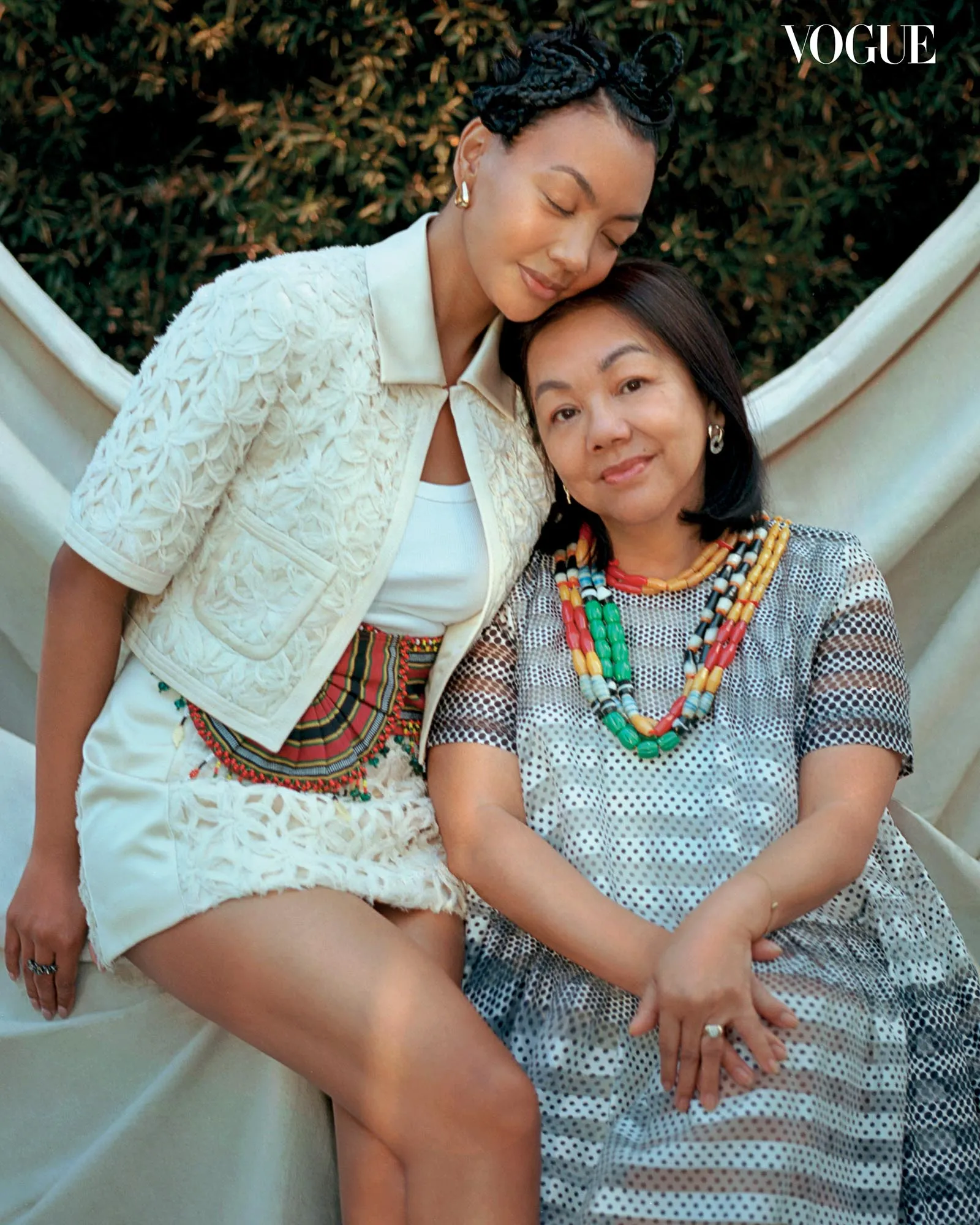
In 2019, during Filipino-American History Month, Asia launched Magandang Morenx, which roughly translates to beautiful brown skin, a movement aimed at confronting colorism and challenging Eurocentric beauty standards within the Filipino community. The idea stemmed from her own childhood experiences in the Philippines, where she was teased for having darker skin.
“Interestingly, I experience both sides of the colorism coin, which has given me a unique perspective on how deeply ingrained and complex colorism truly is,” she shares. “In one space, it’s great to have my skin color and in another, it’s bad to have my skin color. Colorism is not about any intrinsic flaw but about social constructs that shift depending on the community and its history. This perspective has taught me the importance of using my platform to challenge these standards.”
Recognizing the issue’s broader impact, she created the hashtag to spark dialogue around identity and representation. The movement later evolved into a collaboration with LA-based streetwear label Uprisers, culminating in a capsule collection anchored by the phrase “You Can’t Tell Me Who I Am.”
For Asia, being vocal about colorism and racism led her to become part of a larger dialogue, which “pushes you to stay informed, empathic, and intentional.” Embracing the layers of her identity came with doing the work, and a big part of that was education. “As I got older, I realized how little people, even within the Filipino community, actually knew about Indigenous cultures,” Asia says. “I also saw how our narratives were often simplified, stereotyped, or ignored entirely.” At a Filipino American History Month event, she recalls, a peer jokingly asked if she had a tail after learning she was Igorot. “At that moment, I realized how my culture was often reduced to harmful stereotypes or cruel jokes.”
Wanting to understand more for herself, and to correct these misconceptions, she turned to her family. Much of what she learned about Igorot history came from her uncle, Abilene Cirilo, a historian and public servant in the Benguet province. “The information was so hard to find,” she says. “And I just want to share it with everybody.”
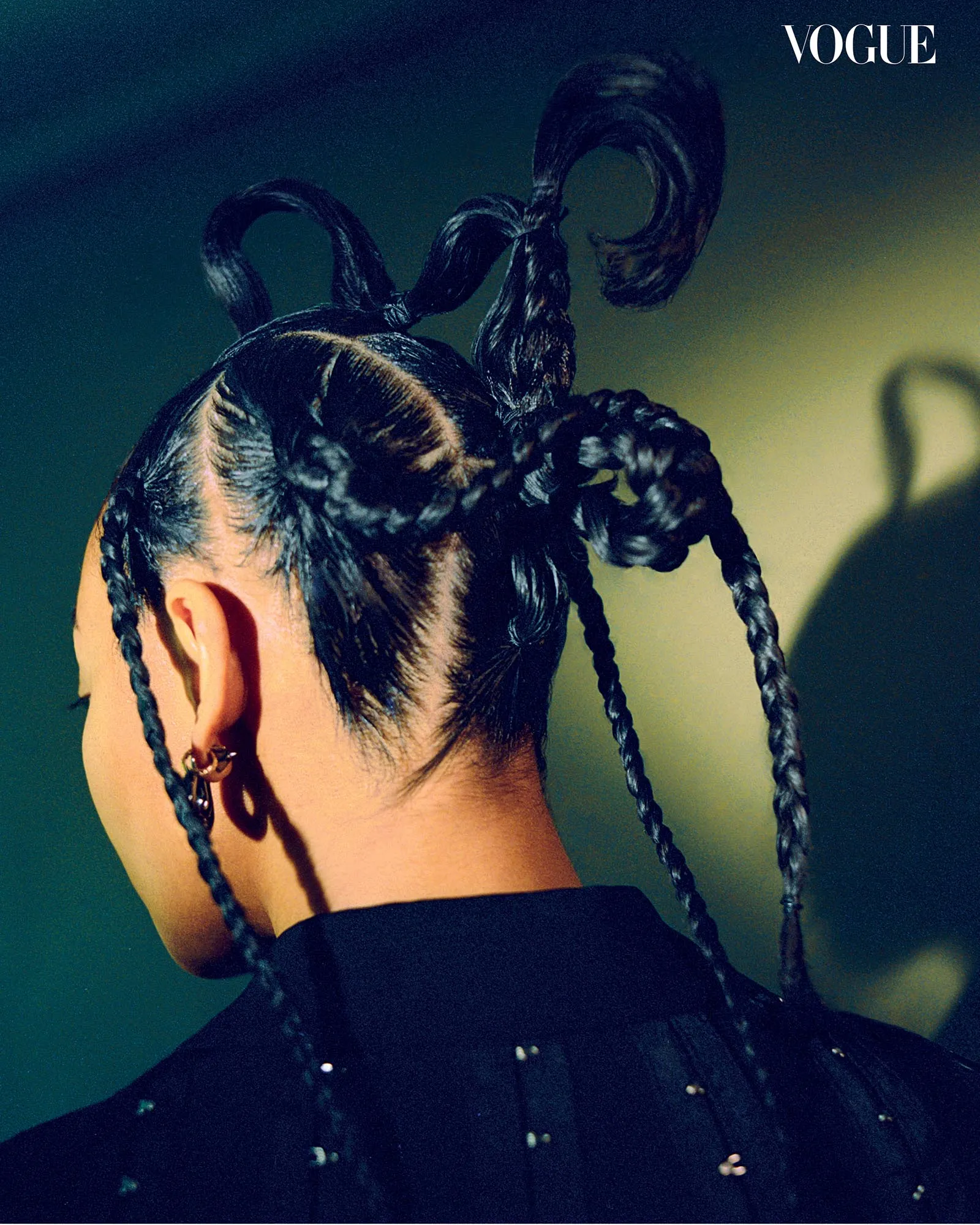
Still, Asia credits her pride and confidence to her mother. “My mom had a strong sense of Indigenous identity, she always knew exactly who and what she was, and she made sure to share those traditions and values with me,” she says. In a culture where indirectness is common in parent-child dynamics, Asia’s experience was different. “She was kind of ahead of her time,” she adds. “If it weren’t for my mom, I wouldn’t be here.”
In 2020, at the height of the pandemic, Asia decided to take antidepressants. Her mental health had taken a turn for the worse, and while the decision to seek help was difficult, she shares that it was her mother who pushed her to prioritize it. She remembers her words clearly: you deserve to be happy. “I grew up in a household where love was openly expressed,” Asia shares fondly. “And I feel so fortunate that the work of breaking generational trauma wasn’t placed on my shoulders. It was something my mom took on herself.” In those hard moments, her mom shared that she had been on antidepressants herself since Asia and her brother were children. This completely changed her perspective.
“A lot of people don’t realize the mental weight of activism,” Asia admits. “It can be emotionally draining to constantly confront the injustices in our society, especially when you feel like your efforts aren’t enough to create immediate change.”
Asia has always been outspoken about what she believes in, but activism, she says, takes a toll. In 2023, she called out Hollywood actress Amy Schumer online for an insensitive joke about Palestine. The exchanges that followed brought both support and intense backlash, more than what Asia had been used to.
“It was a major shift for me,” she reflects. In the months that followed, Asia chose to take a step back from the noise. That time away helped her reframe what advocacy looks like. “Activism doesn’t always have to be loud,” she says. “Sometimes it means quietly taking time to rest and recharge so I can return to work with a clearer mind and a stronger spirit. Burnout helps no one, not me, and not the communities I’m advocating for.”
These days, what fuels Asia most is connection. That intentional intimacy with herself, her heritage, and the world around her is what drives her content, her activism, and her growth. When asked about her goals for the year, she answers with a single word: consistency. Not just in her work, but in her relationships and in showing up for herself and others.
When asked how she would define herself now, she smiles, “Asia Jackson is a girl who’s just trying to make a world that’s better than what she was brought into.”
By BIANCA CUSTODIO. Photographs by CHARLES LU. Beauty Editor JOYCE OREÑA. Styling by KAROLINA FRECHOWICZ. Talent: Asia Jackson, Melinda Jackson. Makeup: Tami Wells. Hair: Andrew Chen Executive Producer: Sara Zion. Production Coordinator: Laura Mittelberg. Producer: Bianca Zaragoza. Art Director: Jann Pascua. Prop Stylist: Yaro Banduro Digi-Tech: Caci. Photo Assistant: Marco Sariñana. Styling Assistant: Ghazal Bazargan. Hair Assistant: Kelly Duong.
